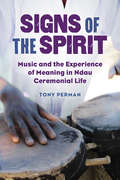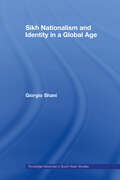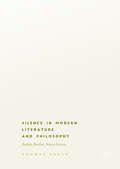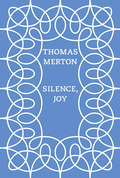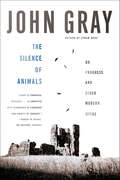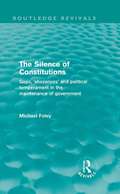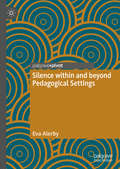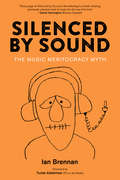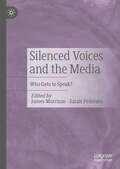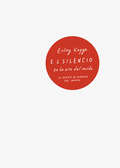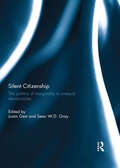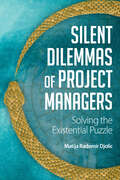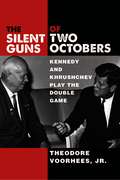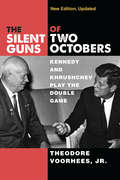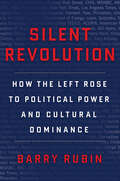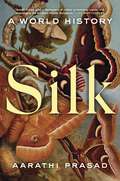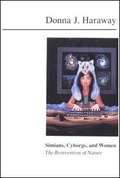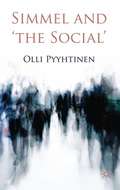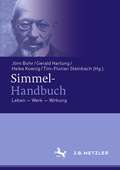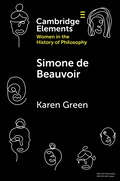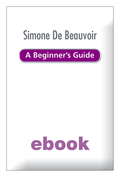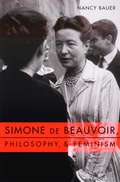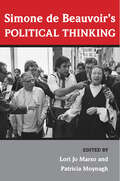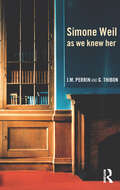- Table View
- List View
Signs of the Spirit: Music and the Experience of Meaning in Ndau Ceremonial Life
by Tony PermanIn 2005, Tony Perman attended a ceremony alongside the living and the dead. His visit to a Zimbabwe farm brought him into contact with the madhlozi, outsider spirits that Ndau people rely upon for guidance, protection, and their collective prosperity. Perman's encounters with the spirits, the mediums who bring them back, and the accompanying rituals form the heart of his ethnographic account of how the Ndau experience ceremonial musicking. As Perman witnessed other ceremonies, he discovered that music and dancing shape the emotional lives of Ndau individuals by inviting them to experience life's milestones or cope with its misfortunes as a group. Signs of the Spirit explores the historical, spiritual, and social roots of ceremonial action and details how that action influences the Ndau's collective approach to their future. The result is a vivid ethnomusicological journey that delves into the immediacy of musical experience and the forces that transform ceremonial performance into emotions and community.
Sikh Nationalism and Identity in a Global Age (Routledge Advances in South Asian Studies #Vol. 9)
by Giorgio ShaniSikh Nationalism and Identity in a Global Age examines the construction of a Sikh national identity in post-colonial India and the diaspora and explores the reasons for the failure of the movement for an independent Sikh state: Khalistan. Based on a decade of research, it is argued that the failure of the movement to bring about a sovereign, Sikh state should not be interpreted as resulting from the weakness of the ‘communal’ ties which bind members of the Sikh ‘nation’ together, but points to the transformation of national identity under conditions of globalization. Globalization is perceived to have severed the link between nation and state and, through the proliferation and development of Information and Communications Technologies (ICTs), has facilitated the articulation of a transnational ‘diasporic’ Sikh identity. It is argued that this ‘diasporic’ identity potentially challenges the conventional narratives of international relations and makes the imagination of a post-Westphalian community possible. Theoretically innovative and interdisciplinary in approach, it will be primarily of interest to students of South Asian studies, political science and international relations, as well as to many others trying to come to terms with the continued importance of religious and cultural identities in times of rapid political, economic, social and cultural change.
Silence: In the Age of Noise
by Erling Kagge Becky L. CrookWhat is silence?Where can it be found?Why is it now more important than ever?In 1993, Norwegian explorer Erling Kagge spent fifty days walking solo across Antarctica, becoming the first person to reach the South Pole alone, accompanied only by a radio whose batteries he had removed before setting out. In this book. an astonishing and transformative meditation, Kagge explores the silence around us, the silence within us, and the silence we must create. By recounting his own experiences and discussing the observations of poets, artists, and explorers, Kagge shows us why silence is essential to sanity and happiness—and how it can open doors to wonder and gratitude.(With full-color photographs throughout.)
Silence in Modern Literature and Philosophy: Beckett, Barthes, Nancy, Stevens
by Thomas GouldThis book discusses the elusive centrality of silence in modern literature and philosophy, focusing on the writing and theory of Jean-Luc Nancy and Roland Barthes, the prose of Samuel Beckett, and the poetry of Wallace Stevens. It suggests that silence is best understood according to two categories: apophasis and reticence. Apophasis is associated with theology, and relates to a silence of ineffability and transcendence; reticence is associated with phenomenology, and relates to a silence of listenership and speechlessness. In a series of diverse though interrelated readings, the study examines figures of broken silence and silent voice in the prose of Samuel Beckett, the notion of shared silence in Jean-Luc Nancy and Roland Barthes, and ways in which the poetry of Wallace Stevens mounts lyrical negotiations with forms of unsayability and speechlessness.
Silence, Joy
by Thomas Merton Christopher WaitAn inspiring gift-edition of poetry and prose from the world's favorite monk-poet In this day of mindless distraction, we’re desperate for reasons to put down our phones and reconnect with our spiritual selves. In time for the 50th anniversary of Thomas Merton's death in 1968, Silence, Joy is an invitation to slow down, take a breath, make a space for silence, and open up to joy. <P><P> Poet, monk, spiritual advisor, and social critic, Thomas Merton is a unique—and uniquely beloved—figure of the twentieth century, and this little rosary brings together his best-loved poems and prose. Drawn from classics like New Seeds Of Contemplation and The Way Of Chuang Tzu as well as less famous books, the writings in Silence, Joy offer the reader deep, calming stillness, flights of ecstatic praise, steadying words of wisdom, and openhearted laughter. Manna for Merton lovers and a warm embrace for novices, this slim collection is a delightful gift.
The Silence of Animals: On Progress and Other Modern Myths
by John GrayA searching, captivating look at the persistence of myth in our modern world"By nature volatile and discordant, the human animal looks to silence for relief from being itself while other creatures enjoy silence as their birthright."In a book by turns chilling and beautiful, John Gray continues the thinking that made his Straw Dogs such a cult classic. Gray draws on an extraordinary array of memoirs, poems, fiction, and philosophy to re-imagine our place in the world. Writers as varied as Ballard, Borges, Conrad, and Freud have been mesmerized by forms of human extremity—experiences that are on the outer edge of the possible or that tip into fantasy and myth. What happens to us when we starve, when we fight, when we are imprisoned? And how do our imaginations leap into worlds way beyond our real experiences?The Silence of Animals is consistently fascinating, filled with unforgettable images and a delight in the conundrum of human existence—an existence that we decorate with countless myths and ideas, where we twist and turn to avoid acknowledging that we too are animals, separated from the others perhaps only by our self-conceit. In the Babel we have created for ourselves, it is the silence of animals that both reproaches and bewitches us.
The Silence of Constitutions: Gaps, 'Abeyances' and Political Temperament in the Maintenance of Government (Routledge Revivals)
by Michael FoleyFirst published in 1989, Michael’s Foley’s book deals with the ‘abeyances’ present in both written and unwritten constitutions, arguing that these gaps in the explicitness of a constitution, and the various ways they are preserved, provide the means by which constitutional conflict is continually postponed. Abeyances are valuable, therefore, not in spite of their obscurity, but because of it.
Silence within and beyond Pedagogical Settings
by Eva AlerbyThis book explores the significance of silence within and beyond pedagogical contexts. Silence is a complex and multidimensional phenomenon for everyday life: since schools mirror society, it is also significant in education. While silence can be experienced in a multitude of different ways, the author reflects on whether silence itself can bear a message: is there an aspect of dialogue in silence, or is it a language all of its own? This book examines a variety of silences essential for education, examining such topics as silence and aspects of power, silent students, and the relationship between listening and silence. Drawing on a range of empirical data, the author elucidates the significance of silence in pedagogical contexts.
Silenced by Sound: The Music Meritocracy Myth
by Ian BrennanPopular culture has woven itself into the social fabric of our lives, penetrating people's homes and haunting their psyches through images and earworms. Justice, at most levels, is something the average citizen may have little influence upon, leaving us feeling helpless and complacent. But pop music is a neglected arena where concrete change can occur—by exercising active and thoughtful choices to reject the low-hanging, omnipresent corporate fruit, we begin to rebalance the world, one engaged listener at a time.Silenced by Sound is a powerful exploration of the challenges facing art, music, and media. Ian Brennan delves into his personal story to address the inequity of distribution in the arts and demonstrates that there are millions of talented people around the world more gifted than the superstars for whom billions of dollars are spent to promote the delusion that they have been blessed with unique genius.Silenced by Sound is defined by muscular, terse, and poetic verse, and a nonlinear format rife with how-to tips and anecdotes. The narrative is driven and made corporeal via the author's ongoing field-recording chronicles, his memoir-like reveries, and the striking photographs that accompany these projects. After reading it, you'll never hear quite the same again.
Silenced Voices and the Media: Who Gets to Speak?
by James Morrison Sarah PedersenThis edited collection delves into the multifaceted theme of 'Silenced Voices,' showcasing a diverse array of perspectives from scholars around the globe. From historical reflections to contemporary analyses, the book examines the complex dynamics of voice suppression and enablement across different media landscapes. Divided into four thematic sections, the chapters explore the challenges faced by marginalized and mainstream voices alike. From the portrayal of silenced narratives in the news media to the representation of underrepresented groups in cultural production, the collection spans a wide spectrum of issues. Authors employ varied methodological approaches to investigate the silencing of voices in the realms of politics, society, and professional media practices. Offering fresh insights and critical reflections, this volume serves as a timely contribution to ongoing debates surrounding freedom of expression, fake news, and the complexities of contemporary media environments.
El silencio en la era del ruido
by Erling Kagge¿Qué es el silencio? ¿Dónde se encuentra? ¿Por qué es hoy más importante que nunca? El ruido del tráfico, las alertas del móvil e incluso el zumbido de nuestros propios pensamientos... el silencio parece inalcanzable. Pero ¿qué es realmente? ¿Dónde se puede encontrar? ¿Por qué es más importante hoy que nunca? Erling Kagge, aventurero y editor noruego, explora, a partir de su experiencia personal y de las ideas de filósofos, escritores y artistas clásicos y modernos, la importancia de aislarse del mundo. Porque silencio no significa necesariamente «ausencia de ruido», sino que es un recurso al alcance de cualquiera y en cualquier lugar: en medio del desierto, pero también en la ducha o en la pista de baile, es posible experimentar la quietud perfecta. Y esta permite el autoconvencimiento y la admiración ante el mundo. Respira profundamente y prepárate para sumergirte en el silencio. Reseñas:«Un pequeño gran libro, cuyo éxito está en la simplicidad. Un título al que vale la pena volver, y que abrirá, espero, los ojos a mucha gente.»Tine Sundal «Un libro de gran sabiduría. Una joya que nos permite ver las conexiones entre vida cotidiana, pensamiento y arte. Kagge es un excelente guía hacia el silencio.»Aftenposten «Erling Kagge es un aventurero filosófico, o quizás un filósofo aventurero.The New York Times
Silent Citizenship: The Politics of Marginality in Unequal Democracies
by Justin Gest and Sean W.D. GrayWhat does silent citizenship mean in a democracy? With levels of economic and political inequality on the rise across the developed democracies, citizens are becoming more disengaged from their neighbourhoods and communities, more distrustful of politicians and political parties, more sceptical of government goods and services, and less interested in voicing their frustrations in public or at the ballot box. The result is a growing number of silent citizens who seem disconnected from democratic politics – who are unaware of political issues, lack knowledge about public affairs, do not debate, deliberate, or take action, and most fundamentally, do not vote. Yet, although silent citizenship can and does indicate deficits of democracy, research suggests that these deficits are not the only reason citizens may have for remaining silent in democratic life. Silence may also reflect an active and engaged response to politics under highly unequal conditions. What is missing is a full accounting of the problems and possibilities for democracy that silent citizenship represents. Bringing together leading scholars in political science and democratic theory, this book provides a valuable exploration of the changing nature and form of silent citizenship in developed democracies today. This title was previously published as a special issue of Citizenship Studies.
Silent Dilemmas of Project Managers: Solving the Existential Puzzle
by Matija Radomir DjolicA fastidious investigation into the nature of self-identity, Silent Dilemmas of Project Managers uses the context of project management to challenge the perceived separation of objective experience from subjective perception. Positioning self-identity as the basis of one’s ongoing being-in-the-world, Djolic explores the relationship between our inner dialogues and the surrounding world, highlighting the problematic role our adopted self-notions play in producing negative experiences. In doing so, we are presented with a compelling case for viewing the subject’s self as the object of existential anxiety, as well as a framework for more comprehensive, existential therapy within business settings.
The Silent Guns of Two Octobers: Kennedy and Khrushchev Play the Double Game
by Theodore VoorheesThe Silent Guns of Two Octobers uses new as well as previously under-appreciated documentary evidence to link the Cuban Missile Crisis to the Checkpoint Charlie tank standoff to achieve the impossible—craft a new, thoughtful, original analysis of a political showdown everyone thought they knew everything about. Ultimately the book concludes that much of the Cold War rhetoric the leaders employed was mere posturing; in reality neither had any intention of starting a nuclear war. Theodore Voorhees reexamines Khrushchev’s and Kennedy’s leadership, decision, and rhetoric in light of the new documentary evidence available. Voorhees examines the impact of John F. Kennedy's domestic political concerns about his upcoming first midterm elections on his handling of the Cuban Missile Crisis through his use of back-channel dealings with Khrushchev during the lead-up to the crisis and in the closing days when the two leaders managed to reach a settlement.
The Silent Guns of Two Octobers: Kennedy and Khrushchev Play the Double Game
by Theodore VoorheesThe Silent Guns of Two Octobers uses new as well as previously under-appreciated documentary evidence to link the Cuban Missile Crisis to the Checkpoint Charlie tank standoff to achieve the impossible—craft a new, thoughtful, original analysis of a political showdown everyone thought they knew everything about. Ultimately the book concludes that much of the Cold War rhetoric the leaders employed was mere posturing; in reality neither had any intention of starting a nuclear war. Theodore Voorhees reexamines Khrushchev’s and Kennedy’s leadership, decision, and rhetoric in light of the new documentary evidence available. Voorhees examines the impact of John F. Kennedy's domestic political concerns about his upcoming first midterm elections on his handling of the Cuban Missile Crisis through his use of back-channel dealings with Khrushchev during the lead-up to the crisis and in the closing days when the two leaders managed to reach a settlement.
Silent Revolution: How the Left Rose to Political Power and Cultural Dominance
by Barry RubinA respected historian and political scientist charts the unchecked rise to power of radical leftism.Over the past fifty years, a silent revolution has allowed the radical left to seize power to an extent unthinkable only a decade ago. Stranger still, no one has noticed.Throughout the twentieth century, leftists worked tirelessly toward their goal of a proletarian revolution. But they continually fell short. American workers rejected socialism in the 1920s and declined to join the international communist movement in the 1930s. The New Left flowered briefly in the 1960s but petered out with the end of the Vietnam War. When the Soviet Union finally collapsed in 1991, radical Marxism seemed to have been defeated and discredited for good.Not so fast, says the political scientist Barry Rubin in this sharply pointed history of the modern American left. Far from disappearing, the radical left has undergone an ideological revolution and has rebranded itself as liberalism. Rubin traces the roots of this new ideology to the ideas of domestic radicals like Saul Alinsky, cultural Marxists like Antonio Gramsci, and Third World revolutionary thinkers like Frantz Fanon. This new brand of leftism constitutes a Third Left that now dominates the liberal movement in the United States.The Third Left’s main ideological innovation is the abandonment of the working class as a revolutionary vehicle. Instead it targets the education system, and it has now trained several generations of Americans to think in leftist terms of fairness and social justice. Imbued with this new “common sense,” these young people have fanned out through the professions, the government, and the media, where they unhesitatingly advance the ideas and goals of the left: anticapitalism, a state-controlled medical system, the semi-nationalization of key industries, the redistribution of wealth, and a rejection of America’s leading role in the world. As a result, without any real debate or understanding, the citizens of the United States have elected the most radical left-wing government in the country’s history.Silent Revolution offers a brief, readable, and utterly devastating critique of the radicalism that masquerades as liberalism today.
Silk: A World History
by Aarathi PrasadA Next Big Idea Book Club Must-Read for April"Aarathi Prasad spins a masterpiece of a story, as luminous, supple, and surprising as the wondrous threads themselves." —Sy Montgomery, bestselling author of The Soul of an Octopus and Of Time and TurtlesThroughout history, across cultures and countries, silk has reigned as the undeniable queen of fabrics, yet its origins and evolution remain a mystery. In a gorgeous and sweeping narrative, Silk weaves together its intricate story and the indelible mark it has left on humanity.Some four thousand years ago, the cultivation of silkworms began, the practice spreading to the far reaches of civilization. With it came a growing obsession with unlocking silk’s secrets to understand how the strongest biological material ever known could be harnessed.Explorers and scientists, including groundbreaking women who pushed the boundaries of societal expectations, dedicated—even sacrificed—their lives to investigate the anatomy of silk-producing animals. They endured unbelievable hardships to discover and collect new specimens, leading them to the moths of China, Indonesia, and India; the spiders of Argentina, Paraguay, and Madagascar; and the mollusks of the Mediterranean.Rich with the complex connections between human and nonhuman worlds, Silk not only peers into the past but also reveals the fiber’s impact today, inspiring new technologies across the fashion, military, and medical fields, and shows its untapped potential to pioneer a more sustainable future.The culmination of author and biologist Aarathi Prasad’s own lifelong passion and grounded in years of research and writing, Silk is an intoxicating read that provides an essential illumination of nature’s most glamourous thread.
Simians, Cyborgs, and Women: The Reinvention of Nature
by Donna J. HarawayA collection of ten essays written mostly during the eighties. With a feminist perspective and the premise that nature is constructed, rather than discovered-- and that truth is made, not found-- Haraway provides an analysis of the popular and scientific struggles involved in the telling of evolutionary tales. The author is a historian of science at the U. of California, Santa Cruz.
Simmel and ‘the Social’
by Olli PyyhtinenThis book argues for the centrality of Georg Simmel's social theory to the relational and processual emphases that are often considered as much more recent developments in social theory. Situating Simmel's work in particular with respect to New Vitalism and Bruno Latour's work, the book shows that Simmel has still an enormous amount to contribute.
Simmel-Handbuch: Leben – Werk – Wirkung
by Jörn Bohr Gerald Hartung Heike Koenig Tim-Florian SteinbachDas vorliegende Handbuch bietet eine umfassende Darstellung von Leben, Werk und Wirkung Georg Simmels (1858–1918). Neben Simmels Herkunft aus den Zusammenhängen einer Völkerpsychologie und früher europäisch-ethnologischer Interessen geht es darum, nächst dem ungleich bekannteren Soziologen v. a. den Philosophen Simmel herauszustellen. Komplementär zu einer Darstellung des Lebens Simmels sowie der Wirkung seines Schaffens werden seine Werke nicht nur inhaltlich dargestellt, sondern auch ihre Kontexte einbezogen und behandelt. Der Versuch, Simmels Denken in seiner ganzen Breite und Vielfalt abzubilden, führt dazu, die in der Forschung klassische Einteilung in drei Phasen von Simmels Werk sowie die Ausdifferenzierung in einen eher philosophisch und eher soziologisch orientierten Denker zu Gunsten einer genaueren Gruppierung der Werkphasen aufzuweichen bzw. mitunter ganz aufzugeben. Ziel ist es, weitere thematische Differenzierungen zu ermöglichen und Kontinuitäten und Zäsuren des Simmelschen Denkens möglichst umfangreich nachzuzeichnen.
Simone de Beauvoir (Elements on Women in the History of Philosophy)
by Karen GreenTracing her intellectual development from her university years, when she was trained in a Cartesian and neo-Kantian philosophical tradition, to her final decade, during which she was recognised as having inspired the emerging strands of late twentieth-century feminism, Beauvoir is shown to have been among the most influential philosophical voices of the mid twentieth century. Countering the recent trend to read her in isolation from Sartre, she is shown to have both adopted, adapted, and influenced his philosophy, most importantly through encouraging him to engage with Hegel and to consider our relations with others. The Second Sex is read in the light of her existentialist humanism and ultimately faulted for having succumbed too uncritically to the masculine myth that it is men who are solely responsible for society's intellectual and cultural history.
Simone de Beauvoir - A Beginner's Guide Ebook Epub (A\beginner's Guide Key Figures Ser.)
by Alison HollandSimone de Beauvoir was among the 20th century's most influential thinkers. She was a philosopher at the forefront of existentialism, a pioneering thinker on women and feminism in ""The Second Sex"", the writer of prize-winning fiction, an autobiographical writer and a committed political activist. Introducing her life and work in a straightforward, jargon-free way, this guide offers readings of her fiction, explores the many facets of her thought and assesses her contribution to the intellectual debate.
Simone de Beauvoir, Philosophy, and Feminism (Gender and Culture Series)
by Nancy BauerIn the introduction to The Second Sex, Simone de Beauvoir notes that "a man never begins by establishing himself as an individual of a certain sex: his being a man poses no problem." Nancy Bauer begins her book by asking: "Then what kind of a problem does being a woman pose?" Bauer's aim is to show that in answering this question The Second Sex dramatizes the extent to which being a woman poses a philosophical problem. This book is a call for philosophers as well as feminists to turn, or return to, The Second Sex. Bauer shows that Beauvoir's magnum opus, written a quarter-century before the development of contemporary feminist philosophy, constitutes a meditation on the relationship between women and philosophy that remains profoundly undervalued. She argues that the extraordinary effect The Second Sex has had on women's lives, then and now, can be traced to Beauvoir's discovery of a new way to philosophize—a way grounded in her identity as a woman. In offering a new interpretation of The Second Sex, Bauer shows how philosophy can be politically productive for women while remaining genuinely philosophical.
Simone de Beauvoir’s Political Thinking
by Patricia Moynagh Emily Zakin Sonia Kruks Lori Marso Karen Shelby Mary CaputiBy exploring the life and work of the influential feminist thinker Simone de Beauvoir, this book shows how each of us lives within political and social structures that we can--and must--play a part in transforming. It argues that Beauvoir’s careful examination of her own existence can also be understood as a dynamic method for political thinking. As the contributors illustrate, Beauvoir's political thinking proceeds from the bottom up, using examples from individual lives as the basis for understanding and transforming our collective existence. For example, she embraced her responsibility as a French citizen as making her complicit in the French war against Algeria. Here, she sees her role as an oppressor. In other contexts, she looks to the lives of individual women, including herself, to understand the dimensions of gender inequality. This volume’s six tightly connected essays home in on the individual’s relationship to community, and how one’s freedom interacts with the freedom of other people. Here, Beauvoir is read as neither a liberal nor a communitarian. The authors focus on her call for individuals to realize their freedom while remaining consistent with ethical obligations to the community. Beauvoir's account of her own life and the lives of others is interpreted as a method to understand individuals in relations to others, and as within structures of personal, material, and political oppression. Beauvoir's political thinking makes it clear that we cannot avoid political action. To do nothing in the face of oppression denies freedom to everyone, including oneself.
Simone Weil as we knew her
by Joseph-Marie Perrin Gustave ThibonSimone Weil (1909-1943) was a defining figure of the twentieth century; a philosopher, Christian (although never baptised), resistance fighter, Labour activist and teacher, described by Albert Camus as 'the only great spirit of our time'. In 1941 Weil was introduced to Father Joseph-Marie Perrin, a Dominican priest whose friendship became a key influence on her life. When Weil asked Perrin for work as a farm hand he sent her to Gustave Thibon, a farmer and Christian philosopher. Weil stayed with the Thibon family, working in the fields and writing the notebooks which became Gravity and Grace and other posthumous works.Perrin and Thibon met Weil at a time when her spiritual life and creative genius were at their height. During the short but deep period of their acquaintance with her, they came to know her as she actually was. First published in English in 1953, and now introduced by J.P. Little, this unique portrait depicts Weil through the eyes of her friends, not as a strange and unaccountable genius but as an ardent and human person in search of truth and knowledge.
